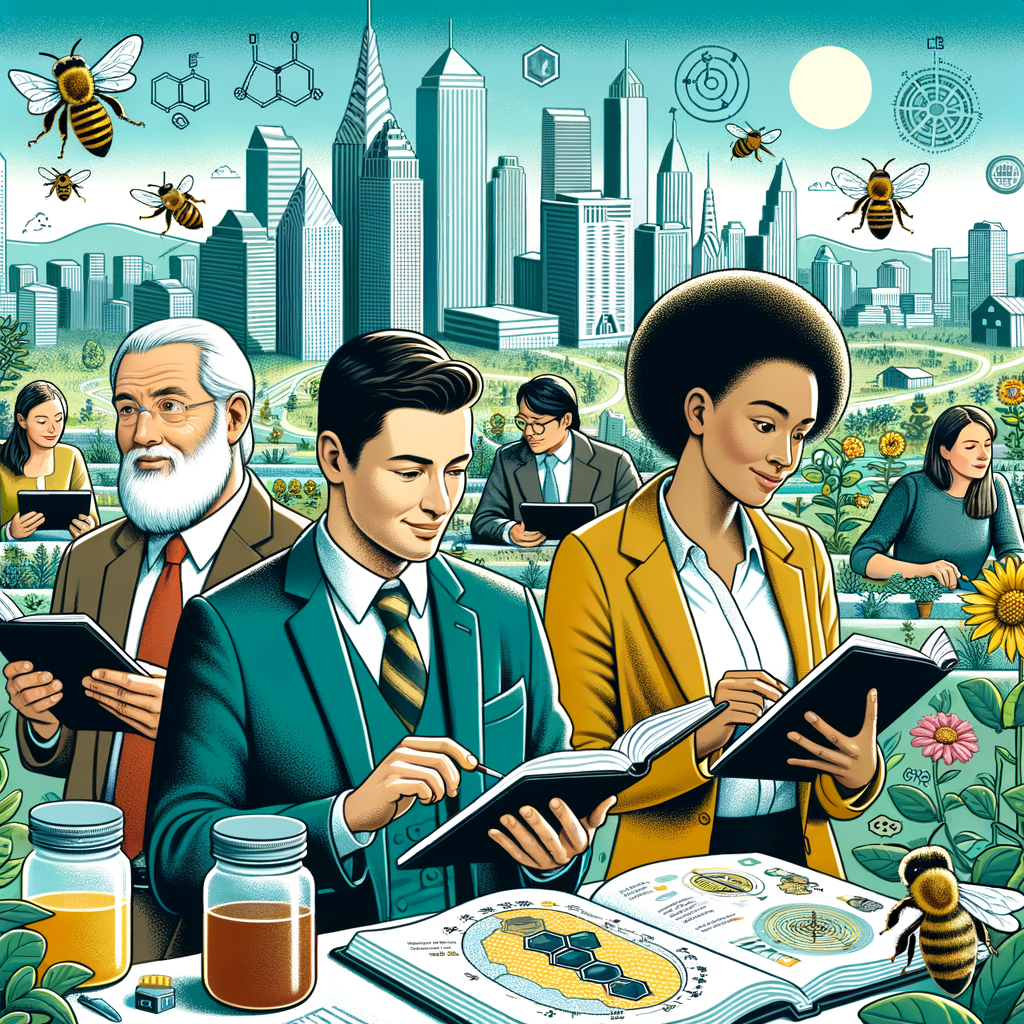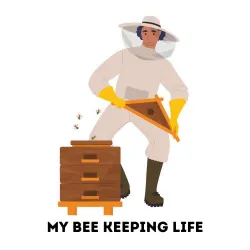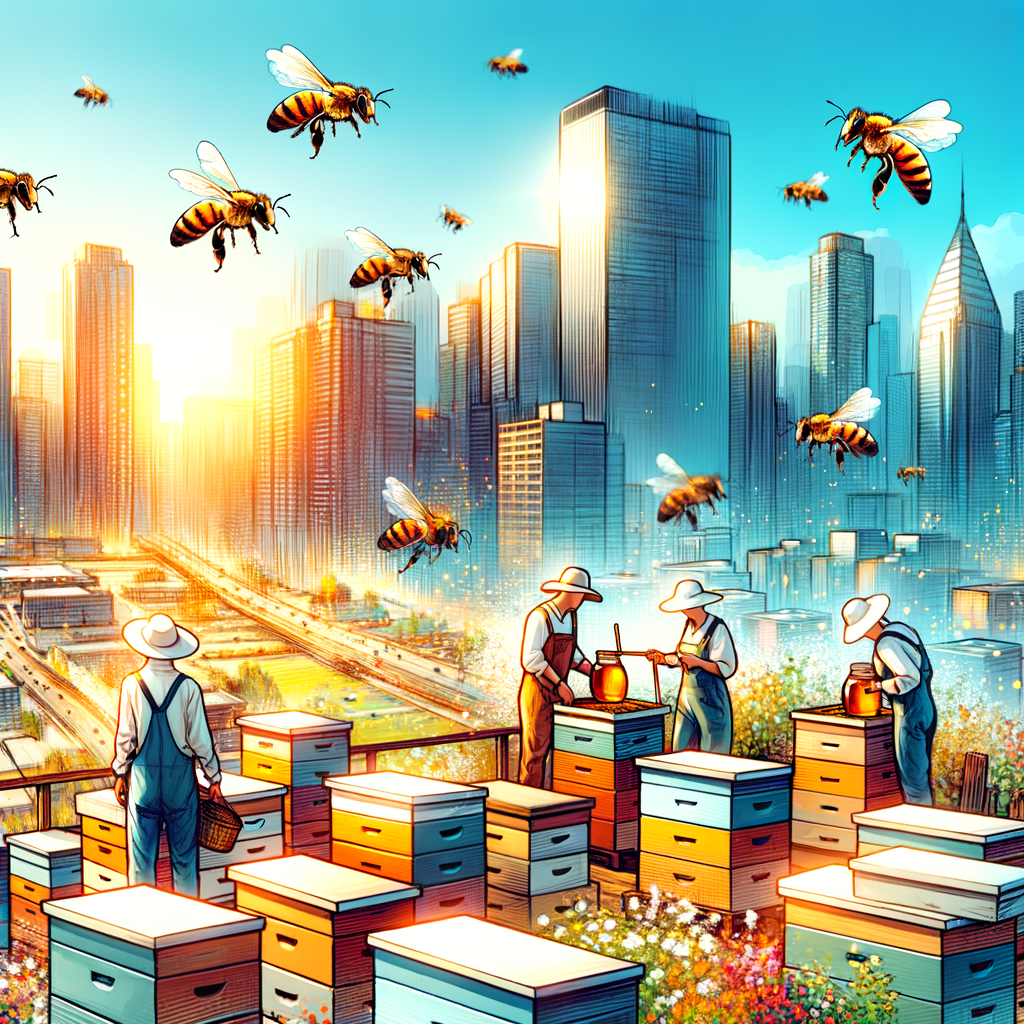
Introduction to Urban Beekeeping
Urban beekeeping is a fascinating world that combines the charm of nature with the hustle and bustle of city life. It’s an exciting journey that requires knowledge, patience, and a deep appreciation for our buzzing friends, the bees. In this section, we will delve into the concept of urban beekeeping, the rise of urban honey production, and the challenges and opportunities that come with beekeeping in cities.
- Understanding the Concept of Urban Beekeeping
- The Rise of Urban Honey Production
- Challenges and Opportunities in Beekeeping in Cities
Urban beekeeping, also known as city or rooftop beekeeping, is the practice of keeping bee colonies in urban areas. This practice is not only about honey production but also about supporting the bee population and promoting biodiversity in cities. Bees play a crucial role in pollination, which is vital for our food system. Urban beekeeping brings this important process right into our cities, contributing to greener and more sustainable urban environments.
Urban honey production has seen a significant rise in recent years. More and more city dwellers are discovering the joy and benefits of beekeeping. Urban honey is unique because the bees have access to a diverse range of flowers in city parks and gardens. This diversity results in honey with complex flavors and a richness that is hard to find in honey produced in rural areas. According to a 2019 survey, urban beekeepers in New York City produced an average of 50 pounds of honey per hive!
Like any other practice, urban beekeeping comes with its own set of challenges and opportunities. One of the biggest challenges is the lack of knowledge about beekeeping among city dwellers. This can lead to misconceptions and fears about bees. However, with proper education and training, these challenges can be overcome.
On the other hand, urban beekeeping offers numerous opportunities. It promotes biodiversity, helps in pollination, and produces delicious honey. Moreover, it’s a rewarding hobby that connects people with nature and fosters community spirit. Many urban beekeepers have formed local groups to share knowledge and experiences, creating a vibrant community of urban bee enthusiasts.
In the following sections, we will delve deeper into the role of education in beekeeping, key components of urban beekeeping education, and a closer look at urban beekeeping training. We will also share some inspiring success stories from the world of urban beekeeping. So, stay tuned and get ready to embark on an exciting journey into the world of urban bees!
The Role of Education in Beekeeping
Education plays a pivotal role in the world of beekeeping. It’s not just about knowing how to handle bees; it’s about understanding their nature, their needs, and their contribution to our ecosystem. Let’s delve deeper into the importance of education in beekeeping and how it fuels sustainable urban beekeeping.
- Importance of education in beekeeping
- How education fuels sustainable urban beekeeping
- Case study: Impact of beekeeping educational programs
Education in beekeeping is crucial for several reasons. First, it provides the necessary knowledge and skills to handle bees safely and effectively. Second, it helps beekeepers understand the vital role bees play in our ecosystem, promoting a sense of responsibility and respect for these tiny creatures. Lastly, education can help mitigate the risks associated with beekeeping, such as bee diseases and colony collapse disorder.
Educating urban dwellers about beekeeping can lead to sustainable practices that benefit both the bees and the community. Knowledge about bees’ needs and behaviors can help urban beekeepers create suitable habitats for them, reducing the risk of colony collapse. Furthermore, education can promote the use of organic, bee-friendly gardening practices, reducing the exposure of bees to harmful pesticides. As a result, urban areas can become safe havens for bees, contributing to their conservation.
Several educational programs have demonstrated the positive impact of beekeeping education. For instance, the Honeybee Conservancy’s Sponsor-a-Hive program provides educational materials and resources to schools across the United States. As a result, students learn about the importance of bees and gain hands-on beekeeping experience. According to the Honeybee Conservancy, these educational efforts have led to increased interest in beekeeping and a greater understanding of bees’ importance in our ecosystem.
In conclusion, education is a key component in successful and sustainable beekeeping. By providing the necessary knowledge and skills, education empowers individuals to become responsible beekeepers, contributing to the conservation of bees and the enhancement of our urban environments.
Urban Beekeeping Education: Key Components
Urban beekeeping education is a comprehensive process that involves several key components. Let’s delve into these critical areas to better understand what it takes to become a successful urban beekeeper.
- Understanding bees and their behavior
- Learning about beekeeping equipment
- Practical training in bee handling and honey extraction
- Learning about bee health and disease management
Bees are fascinating creatures with complex behaviors. They communicate through dances, produce honey, and play a crucial role in pollination. Understanding their life cycle, social structure, and communication methods is the first step in becoming a beekeeper. This knowledge will help you create a suitable environment for your bees and understand their needs.
Like any other profession, beekeeping requires specific tools and equipment. This includes a bee suit for protection, a smoker to calm the bees, a hive tool for opening the hive, and frames for the bees to build their comb. Learning about these tools and how to use them effectively is a critical part of beekeeping education.
Handling bees and extracting honey are skills that require hands-on training. Through practical sessions, you’ll learn how to safely handle bees, inspect the hive, and extract honey without harming the bees or damaging the hive. This practical experience is invaluable in preparing you for the realities of urban beekeeping.
Just like any other living creature, bees can get sick. They can be affected by various diseases and pests that can harm the hive. Learning about these potential threats and how to manage them is crucial for maintaining a healthy bee colony. This includes understanding the signs of disease, knowing how to treat it, and taking preventative measures to keep your bees healthy.
In conclusion, urban beekeeping education is a multifaceted process that requires a deep understanding of bees and their behavior, knowledge of beekeeping equipment, practical training in bee handling and honey extraction, and learning about bee health and disease management. By mastering these key components, you can become a successful urban beekeeper and contribute to the health and sustainability of our urban ecosystems.
Urban Beekeeping Training: A Closer Look
Urban beekeeping is a fascinating and rewarding hobby that not only benefits the bees but also the environment. To become a successful urban beekeeper, proper training is crucial. Let’s take a closer look at the different types of beekeeping courses available.
Types of Beekeeping Courses
There are various types of beekeeping courses designed to cater to different learning styles and preferences. Here are the three main types:
- Online Beekeeping Courses: These courses are perfect for those who prefer to learn at their own pace and in the comfort of their own home. They usually include video tutorials, written materials, and online quizzes. Topics covered can range from the basics of bee biology to advanced beekeeping techniques.
- Hands-On Beekeeping Workshops: These workshops provide practical experience in handling bees and managing hives. They are typically conducted by experienced beekeepers and often take place in apiaries. Participants get to learn about bee behavior, hive inspection, honey extraction, and more.
- Community-Based Beekeeping Training Programs: These programs are usually organized by local beekeeping associations or community centers. They offer a mix of theoretical and practical training, and participants often get the chance to interact with fellow aspiring beekeepers in their community.
Choosing the right type of course depends on your personal learning style, availability, and budget. Regardless of the type of course you choose, the important thing is to gain a solid understanding of bee biology, hive management, and sustainable beekeeping practices.
Key Takeaways from Beekeeping Training
After completing a comprehensive beekeeping training, there are several key insights and skills you will have gained. These are not only essential for managing your own urban beekeeping practice, but also for contributing to a sustainable future for our buzzing friends. Let’s delve into these key takeaways:
- Understanding Urban Beekeeping Practices
- Learning about Bee Biology and Behavior
- Gaining Practical Skills in Beekeeping
- Learning about Sustainable Beekeeping Practices
Urban beekeeping is a unique practice that requires a distinct set of skills and knowledge. You’ll learn how to manage hives in a city environment, navigate local regulations, and work within the constraints of urban spaces. You’ll also understand the importance of bees in urban ecosystems and how to promote their health and wellbeing.
Bees are fascinating creatures with complex behaviors and biology. In your training, you’ll delve into the world of bees, learning about their life cycle, their roles within the hive, and their unique behaviors. This knowledge is crucial for managing a healthy hive and promoting bee populations.
From setting up a hive to harvesting honey, beekeeping is a hands-on practice. Your training will equip you with the practical skills needed to manage a hive, handle bees safely, and troubleshoot common issues. You’ll gain confidence in your abilities and be ready to start your own urban beekeeping practice.
Sustainability is a key aspect of modern beekeeping. You’ll learn how to manage your hives in a way that promotes the health of bee populations and the wider environment. This includes understanding the impact of pesticides, the importance of biodiversity, and how to ensure your beekeeping practices are beneficial for all.
In conclusion, beekeeping training provides a wealth of knowledge and skills that are crucial for any aspiring urban beekeeper. By understanding urban beekeeping practices, learning about bee biology and behavior, gaining practical skills, and learning about sustainable beekeeping practices, you’ll be well-equipped to start your own urban beekeeping journey.
Case Studies: Urban Beekeeping Success Stories
Let’s take a look at some of the most successful examples of urban beekeeping from around the world. These case studies show how education, dedication, and a love for bees can transform urban environments.
-
Case study: Urban beekeeping in New York City
In the heart of New York City, urban beekeeping is thriving. The city is home to hundreds of beekeepers who manage thousands of beehives. Despite the bustling city life, bees find a haven in rooftop gardens and city parks. The city’s beekeepers have reported high honey yields, proving that urban beekeeping can be successful even in the most unlikely of places. This success story is a testament to the resilience of bees and the dedication of urban beekeepers.
-
Case study: The role of education in promoting beekeeping in London
London has seen a surge in urban beekeeping, thanks in large part to educational initiatives. Organizations like the London Beekeepers’ Association offer courses and workshops to educate the public about the importance of bees. Their efforts have resulted in a growing number of urban beekeepers and a greater understanding of bees among city residents. This case study shows the power of education in promoting urban beekeeping.
-
Case study: How beekeeping courses transformed urban beekeeping in Berlin
Berlin is another city where urban beekeeping is flourishing, largely due to beekeeping courses. These courses have equipped city residents with the knowledge and skills they need to start their own beehives. As a result, Berlin now boasts a thriving community of urban beekeepers. This case study highlights the transformative impact of education on urban beekeeping.
These case studies demonstrate the potential of urban beekeeping. With the right education and resources, urban residents can play a crucial role in supporting bee populations and contributing to local ecosystems.
Conclusion: The Future of Urban Beekeeping
As we reach the end of our exploration into urban beekeeping, it’s clear that this practice holds immense potential for the future. Not only does it contribute to sustainable city living, but it also promotes ongoing education and awareness about the importance of bees in our ecosystem.
- The potential of urban beekeeping for sustainable cities
- The role of ongoing education in advancing urban beekeeping
- Final thoughts on the importance of urban beekeeping education
Urban beekeeping is more than just a hobby; it’s a step towards creating sustainable cities. Bees play a crucial role in pollination, which is vital for the growth of plants and food crops. By maintaining hives in urban areas, we can help to boost local plant diversity and contribute to a healthier environment. Moreover, the honey produced can serve as a local, sustainable food source, reducing the need for transport and the associated carbon emissions.
Education is the key to advancing urban beekeeping. By providing training and resources, we can equip city dwellers with the skills they need to maintain their own hives. This not only helps to spread the practice of beekeeping, but it also raises awareness about the importance of bees and the threats they face. As more people learn about bees and start to care for their own hives, we can hope to see a positive impact on bee populations.
Urban beekeeping education is not just about teaching people how to keep bees; it’s about fostering a deeper understanding and appreciation of these incredible creatures. Through education, we can inspire more people to take up beekeeping and contribute to a brighter future for our cities and our bees.
In conclusion, urban beekeeping holds great promise for the future. It offers a path towards more sustainable cities, promotes ongoing education, and helps to protect our vital bee populations. As we move forward, let’s continue to spread the word about the importance of bees and the role that urban beekeeping can play in their conservation.








